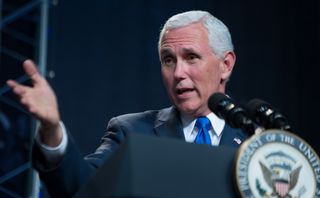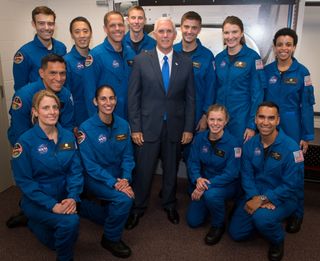Vice President Welcomes NASA's 'Newest Heroes' to Astronaut Corps
NASA's newest class of astronauts was introduced to the world today, and Vice President Mike Pence was on hand to wish the new astronauts well.
"I can't tell you how privileged and honored I feel today to be able to congratulate the newest class of American heroes: the 2017 class of America's astronauts," Pence said during his speech at NASA's Johnson Space Center in Houston, home of the agency's human spaceflight program. Pence spoke during a ceremony today (June 7) to introduce the 12 new members of NASA's astronaut core.
"To this newest class, it's my honor to bring the sincere congratulations of the 45th president of the president of the United States of America, President Donald Trump," Pence said. "Your president is proud of you, and so am I. And President Donald Trump is firmly committed to NASA's noble mission: leading America in space." [What It's Like to Become an Astronaut: 10 Surprising Facts]

Pence discussed his own lifelong love of space, his memories of watching the Apollo missions launch during his childhood, and the experience of seeing several space shuttle launches from Kennedy Space Center with his wife and children. Pence said he believes his own son was inspired to become a Marine Corps aviator because of an experience seeing one of those launches and watching as "America's heroic astronauts [were] hurled into the heavens."
"It really is a joy for this lifelong NASA fan to be standing here at the Johnson Space Center," Pence said. "On my birthday no less!"
The vice president turns 58 today.

In his speech, the vice president brought up the NASA Transition Authorization Act of 2017, which President Trump signed into law in March. The legislation provides support for two of NASA's biggest human spaceflight programs: the Space Launch Systems heavy-lift rocket and the Orion human spaceflight capsule.
Get the Space.com Newsletter
Breaking space news, the latest updates on rocket launches, skywatching events and more!
The act also re-establishes the National Space Council, a body that advises the president on matters of space policy and legislation, but has no power to draft or enact legislation or policy. Before the signing of the act, it was announced that the vice president would chair the council. Two previous iterations of the space council have existed in the past, the first from 1958 to 1973 and the second from 1989 to 1993.
"President Trump … recognizes that America needs a coherent and cohesive approach to the last and greatest frontier," Pence said. "That's why I'm especially excited to announce, after more than two decades from when it was disbanded, [that] President Trump will relaunch the National Space Council, and it will be my great honor as vice president of the United States to chair the new National Space Council in Washington, D.C."
Spaceflight policy experts have debated the usefulness and effectiveness of such a council, based on various factors.
"The National Space Council will re-energize the pioneering spirit of America in space," Pence said. "And it will ensure that America never again loses our lead in space exploration, innovation and technology."
Pence did not address specific examples of programs or areas in which the country needed to regain a leadership position in space. He did note that the current administration believes in orienting the human space program toward deep-space exploration (referring to destinations beyond the moon) as well as providing "the capabilities for America to maintain a constant presence in low-Earth orbit and beyond."
The U.S. currently maintains a continuous presence in low-Earth orbit on the International Space Station, but NASA is financially committed to support the operation and maintenance of the station only through 2024.
In his speech, Vice President Pence also talked about the history of NASA's astronaut program, invoking the names of well-known astronauts, including Neil Armstrong, Alan Shepard, Mae Jemison and Sally Ride.
"In the years to come, you will depart from this blue marble and take your place among the role of America's legends, who have broken past the bonds of Earth," Pence said. "Now, their legacy falls to you, and you'll follow in their contrails and chart a path into the unknown.
"As American astronauts, you may return our nation to the moon. You may be the first to travel to Mars. You may have experiences that we can only imagine, those of us that walk on terra firma. But as you go forth be assured: the American people stand with you."
Follow Calla Cofield @callacofield.Follow us @Spacedotcom, Facebook and Google+. Original article on Space.com.
Join our Space Forums to keep talking space on the latest missions, night sky and more! And if you have a news tip, correction or comment, let us know at: community@space.com.

Calla Cofield joined Space.com's crew in October 2014. She enjoys writing about black holes, exploding stars, ripples in space-time, science in comic books, and all the mysteries of the cosmos. Prior to joining Space.com Calla worked as a freelance writer, with her work appearing in APS News, Symmetry magazine, Scientific American, Nature News, Physics World, and others. From 2010 to 2014 she was a producer for The Physics Central Podcast. Previously, Calla worked at the American Museum of Natural History in New York City (hands down the best office building ever) and SLAC National Accelerator Laboratory in California. Calla studied physics at the University of Massachusetts, Amherst and is originally from Sandy, Utah. In 2018, Calla left Space.com to join NASA's Jet Propulsion Laboratory media team where she oversees astronomy, physics, exoplanets and the Cold Atom Lab mission. She has been underground at three of the largest particle accelerators in the world and would really like to know what the heck dark matter is. Contact Calla via: E-Mail – Twitter